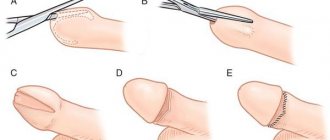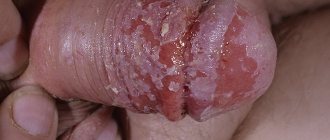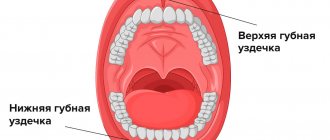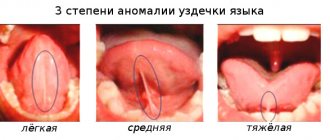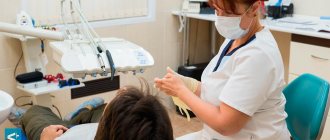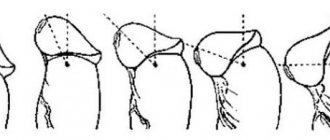How to prepare for frenuloplasty
In the process of preparing for surgery, you should consult with a urologist, who will draw up a complete list of recommendations based on the individual characteristics of the patient and the results of the tests performed. A week before the planned procedure, it is necessary to avoid taking any aspirin and non-steroidal anti-inflammatory drugs.
On the day of surgery, you need to perform a number of simple steps:
- carry out a thorough toilet of the genitals and hygienic cleaning using special products for the care of the intimate area;
- shave the scrotal area;
- give up caffeine in the morning, and breakfast should be as light as possible, without fatty foods;
- Bring a set of sterile wipes and spare linen with you to the clinic.
If the patient is allergic to various drugs, you must inform your doctor about this, and take an antihistamine the day before frenuloplasty. In cases of a negative reaction of the body to general anesthesia, it is required to notify the anesthesiologist.
Compliance with all general recommendations for preparing for the correction procedure contributes to the most effective implementation of all surgical procedures with minimal risks of subsequent deviations.
Classification of frenulotomy
The presented operation takes very little time, but at the same time provides a 100% result in solving the main problems with the functioning of the frenulum. To implement your plan, you don’t even have to use general anesthesia, because you will be able to limit yourself to a local solution that is safer for the cardiovascular system. The injection is given into the penis itself and after a few minutes you can operate. If the victim has not reached the age of eighteen, then he is given anesthesia intravenously.
The procedure, even including pain relief, lasts no more than twenty minutes.
The exact date will be announced by the specialist, based on the chosen treatment method. In total, there are a duet of variations of surgical intervention for these purposes:
- classical;
- laser.
The traditional proposal relies on the use of a surgical scalpel. Despite the development of modern technologies with a variety of thematic innovative equipment, it is the scalpel technique that is still the most in demand. The only possible drawback here is extensive blood loss compared to the laser analogue and the risk of tissue infection. But in the latter case, doctors simply recommend contacting clinics with a proven reputation in order to mitigate such risks.
Those who want to get an ideal result with minimal blood loss choose the laser approach. It is believed that the rays generated by such a device have a gentler effect on tissue than a scalpel. The technical safety of the method is explained by the fact that the rays trigger the coagulation of cells and blood vessels, which provokes the evaporation of liquid instantly. Due to this, the recovery period is much easier to bear, and the incision sites remain almost invisible to the naked eye.
But the advantage of the technique can become its significant disadvantage. For the absence of visible seams, you will have to pay the price of keeping the penis completely calm during the rehabilitation period. As soon as even a slight erection begins at the recovery stage, the welded tissues will separate. Sometimes the erection process starts even unconsciously in patients, so doctors have to remind them of the need to fix the position. Otherwise, repeated divergence of the soldered section threatens the formation of a rough scar.
But with a laser solution, you don’t have to worry about infection, which was made possible thanks to the ability of the laser beam to make a cut by heating up to 400 degrees Celsius. Some ordinary people believe that the issue of infection is nothing more than a horror story. But statistics say that about 10% of possible complications after surgery are due to the development of inflammation due to infection.
But even if everything went as smoothly as possible, there is still a chance of complications such as:
- pain syndrome;
- swelling;
- bleeding;
- scarring.
The finished result does not always satisfy the patient from an aesthetic point of view, which most often has its roots in the unprofessionalism of the specialist or the congenital pathologies of the victim.
Most of the side effects can be neutralized on an outpatient basis, which means there is no mandatory hospitalization. To relieve pain, the doctor will prescribe suitable analgesics, and specialized ointments are used to level out extensive swelling.
Manipulation technique
In medicine, two directions of correction of the frenulum of the genital organ are used:
- frenulotomy, dissection of the connecting tissues of a previously intact frenulum;
- frenuloplasty, restoration of the length of the frenulum when a scar forms after its rupture.
The manipulation technique involves dissecting the tissues of the frenulum in the transverse direction, followed by stitching them longitudinally, increasing its length. The operation is performed using local anesthetics and takes no more than a quarter of an hour; the patient remains under observation for about half an hour, after which he is sent home. The period of complete recovery takes from two weeks to a month.
Immediately after the operation, no extraneous sensations are observed; during the next 24 hours after the intervention, some discomfort and pain persist:
- this is due to the presence of a wound surface that comes into contact with urine when the bladder is emptied;
- as well as during spontaneous erection at night, when, with an increase in the size of the organ, tension occurs in the unhealed tissues.
After healing, a neat suture remains, which runs along the lower zone of the organ. Restoring the length of the frenulum allows you to fully and painlessly open the head, without causing pain and discomfort during erection and sexual intercourse.
Symptoms and diseases of the frenulum of the penis:
- Rupture of the frenulum of the penis
- Removal of the frenulum of the penis
- Growths on the frenulum of the penis
- Soreness of the frenulum of the penis
- Papillomas on the frenulum of the penis
- Rash on the frenulum of the penis
- Itching of the frenulum of the penis
- Frenum of the penis
- Inflammation of the frenulum of the penis
- Swelling of the frenulum of the penis
Postoperative period
The postoperative recovery period usually does not exceed two weeks. The course of the operation along with preliminary preparation is as follows:
- On the eve of the procedure, the patient removes hair from the skin in the genital area.
- In the morning before surgery, a light breakfast is not prohibited.
- Before surgery, local anesthesia is given, which allows the conscious patient not to experience discomfort.
- The specialist makes a transverse incision of the longitudinal fold.
- It is sutured in the longitudinal direction.
- If there is scar tissue at the injury sites, the doctor will excise it with a scalpel.
- The last step is to apply absorbable sutures.
As a rule, the patient is not hospitalized for frenulotomy. After the stitches are applied, the patient's condition is monitored by health workers for a certain period of time. If he feels satisfactory, he can return to his usual way of life.
Complications after frenuloplasty
The procedure is a simple operation and is carried out quite quickly; on average, all surgical procedures take from 15 to 30 minutes. The number of risks is minimal.
Among the undesirable consequences are:
- infection in the wound, which contributes to the formation of balanoposthitis;
- allergic reaction of the body to the use of various anesthetics;
- suture dehiscence and subsequent bleeding;
- painful sensations in the area of the lower part of the penis;
- swelling of the foreskin;
- purulent discharge from the wound formed after the intervention;
- increase in body temperature.
Infectious infections occur quite rarely due to the use of antimicrobial drugs, which are prescribed to the patient for the rehabilitation period. The maximum duration of pain after the correction is two months.
Rehabilitation after surgery
The recovery period after surgical procedures takes on average about a month. During this period of time, a scar is formed and natural blood circulation in the area of the head of the penis is restored.
To speed up the rehabilitation process, it is necessary to consult with a urologist, who, based on the patient’s individual indicators, will give a number of recommendations.
Here is a list of general doctor’s instructions, compliance with which will allow you to quickly return to natural intimate life and eliminate the risks of complications:
- the developing scar will require special care in the form of treatment with special solutions during the first week;
- complete abstinence from sexual contact until the wound heals;
- when urinating, you will need to bend the head of the penis so that urine does not get into the wound, this will help avoid unwanted irritation and the risk of infection;
- reduction of physical activity;
- carefully follow the antimicrobial regimen.
To soften the friction of the formed scar during sexual intercourse, after the recovery period has expired, you should use lubricants. If the doctor's instructions are not followed, complications may arise that require repeat surgery, which will be much more painful and will lead to the formation of scar tissue and a subsequent decrease in the normal functioning of the sexual organ.
Recovery period after frenulotomy
After completing the manipulations, the patient remains under the supervision of medical personnel for several more hours, after which, if there are no complications, he is sent home, recommending leaving the bandage on for at least 12 hours (or better yet, for one day). After this, it must be removed and the operated area kept open.
To prevent infection of the wound, he needs to regularly treat the seams with a solution of potassium permanganate or “green paint”. Elimination of pain symptoms in the first days is carried out by taking painkillers.
During the rehabilitation period, the patient should adhere to the following recommendations of the attending physician:
- carry out hygiene measures after each visit to the toilet and use an antiseptic solution prescribed by a doctor for this;
- take a course of antibiotics to prevent the development of purulent infections;
- during rapid healing, do not use fat-based ointments, as they can prolong the rehabilitation period;
- visit a urologist a week after the operation so that he can determine the need to remove the remaining threads, which should be completely resolved by this time.
In addition, during the recovery period you should avoid:
- physical activity and sports;
- visits to baths, saunas, swimming pools;
- taking baths;
- sexual intercourse and masturbation.
The latter is necessary in order to eliminate the risk of seams coming apart.
Operation methods
There are several ways to perform plastic surgery of the frenulum of the penis, which depend on the anatomical features of the structure of the structural tissue of the foreskin.
Among the main methods, there are two types of surgery:
- Frenulotomy.
Lengthening the frenulum occurs by cutting in the transverse direction followed by longitudinal stitching, which allows you to naturally increase the length of the fabric up to 2 centimeters. With this method, the sensitivity of the genital organ is not affected. - Frenulectomy
. Complete removal of the frenulum, which is required for mechanical injuries of the foreskin and scarring of the tissue. The incision is made transversely around the circumference of the genital organ, followed by longitudinal stitching. The result is a scar that aligns with the natural suture at the bottom of the penis.
Quite often, both methods are implemented without the use of classical surgical instruments. Intervention in the tissue structure is carried out through laser exposure. The technology of the procedure fully complies with generally accepted rules, with the exception of the use of radiofrequency exposure instead of a scalpel; instead of stitching, the edges of the resulting wound are soldered.
The main advantage of using modern equipment is the minimal risk of bleeding during the process and natural disinfection of the wound through exposure to high temperatures.
Answers to frequently asked questions on the topic of the frenulum of the penis:
- Which doctor treats frenulum of the foreskin?
- Where to go with a problem on the frenulum of the foreskin?
- What tests should be taken if there are problems with the frenulum of the penis?
- Diagnosis of diseases of the frenulum of the penis
- Treatment of diseases of the frenulum of the penis
- Is it possible to remove the frenulum of the penis?
- Swollen frenulum of the penis
- Rash on the frenulum of the penis
- Herpes on the frenulum of the penis
- How does the foreskin affect sensitivity?
- How to stretch the foreskin?
- What is the foreskin for?
- Diagnosis of diseases of the foreskin?
- Why doesn't the foreskin open completely?
- What to do if the foreskin is swollen?
- Have plaque appeared under the foreskin?
- Do you perform foreskin plastic surgery at your clinic?
Indications for surgery
The longitudinal fold of skin connecting the foreskin to the head of the penis is very vulnerable, and the quality of sexual life largely depends on it. Insufficient length of the frenulum in men is observed quite often and with such a violation during intercourse, noticeable discomfort occurs due to the impossibility of exposing the head of the penis. The risk of frenulum rupture and subsequent bleeding appears much more serious. As a result, frenulotomy becomes a vital necessity for sexually active men.
Indications for surgery are the following situations arising against the background of the defect in question:
- Pain that occurs during sexual intercourse or during masturbation. Such unpleasant sensations arise due to stretching of the frenulum during intense intercourse.
- When aroused, curvature of the penis occurs.
- The appearance of ruptures leading to bleeding and the formation of scar tissue.
- Problems with satisfying a partner, since at the moment of intimacy, psychological discomfort arises against the background of previous failures.
The consequence in the presence of such a pathology can be a complete refusal of the stronger sex from sexual relations against the backdrop of fear of experiencing pain again and feeling their own inadequacy. Despite the fact that plastic surgery can solve the problem quite simply, it is not applicable in all cases; the following are contraindications:
- the presence of infectious pathologies in the acute stage;
- worsened chronic diseases;
- inflammation occurring in the scrotum or in the skin of the foreskin.
Important. In the presence of these situations, the operation is performed only after final recovery, which should be confirmed by a medical examination.
Despite the fact that the problem in question can be eliminated exclusively by surgery, the operation is not dangerous or difficult. It is performed using local anesthesia and after the procedure is completed, if the patient is in satisfactory condition, the patient can leave the clinic.
What tests need to be done before surgery?
At the preparatory stage, before surgery, the patient must undergo a series of diagnostic measures as prescribed by the doctor. The main tests that will need to be taken include:
- general urine analysis;
- clinical blood test to study its coagulability in order to exclude possible bleeding during surgery;
- standard samples for research to detect syphilis, various groups of hepatitis and other sexually transmitted diseases;
- biochemical blood sampling.
Based on the results obtained, further diagnostic measures will be formed, if required. If all tests are normal, frenuloplasty surgery will be planned based on the information received and the individual characteristics of the patient.
WHAT IS A SHORT FRENALE OF THE FORESKUS
This diagnosis is made in cases where the frenulum is of insufficient length and extensibility, which makes it difficult to expose the head of the penis during erection. Pathology can be congenital or acquired; congenital short frenulum is often detected only at the beginning of sexual life.
Normally, the frenulum should be elastic; stretching it should not cause a feeling of tightness or pain. If the frenulum is pathological, during intense friction it may rupture - an extremely painful and unpleasant condition. If the man does not turn to a surgeon and waits until he lives on his own, a scar will form at the site of the rupture.
The scar affects the length of the frenulum - it will make it even shorter. Therefore, each sexual intercourse after a rupture (if the problem is not resolved by a surgeon) will cause a high risk of re-rupture. With all the consequences.
Some men suffer from frequent frenulum ruptures, which can easily be avoided with simple surgery. Physiological problems, when there is no full sexual intercourse, cause psychological complexes. In particular, there is an elementary fear of severe pain that occurs during a rupture, decreased libido and even erectile dysfunction.
Common consequences include a complete refusal of sexual life or the search for unconventional ways of sexual gratification. In addition, periodic injury to the penis often provokes inflammatory and infectious processes, phimosis and paraphimosis, and rapid ejaculation.
Where to have plastic surgery of the frenulum of the penis?
Our clinic uses modern equipment and has all the necessary tools for safe interaction with the patient. The consultation is conducted by doctors with extensive experience and knowledge in various branches of urology, who will give practical recommendations on preparing for the procedure, and then draw up the most effective plan for the rehabilitation period.
Our clinic has:
- specialized rooms for conducting hardware diagnostics;
- own laboratory for prompt research of the obtained tests;
- a modern operating room equipped with the required equipment and the necessary additional technical components.
During the operation, high-quality asepsis is used, which minimizes the risk of possible infectious complications later. A delicate approach that allows you to solve all intimate problems in a strictly confidential manner.
Which doctor performs frenuloplasty?
If you have problems with the frenulum on the foreskin, you should consult a urologist. The doctor will conduct an initial examination and, if necessary, prescribe additional diagnostic measures, on the basis of which a decision will be made on the possibility of performing frenuloplasty.
After the operation, the urologist will consult the patient and give recommendations for the entire period of rehabilitation. If you fully comply with the doctor’s instructions, the surgical intervention will be carried out quickly and painlessly, eliminating possible complications in the future.
How can you speed up the healing process?
Wound healing during the rehabilitation period requires four to seven days. During the first 24 hours, there may be slight soreness in the operated area. The discomfort finally disappears on the second or third day after the plastic surgery.
For best results, show:
- Treat the problem area with antiseptic agents.
- Use underwear made from natural fabrics.
- Temporarily avoid sexual contact.
- Avoid increased physical stress.
The patient is allowed to return to sexual activity after removal of the sutures or, if absorbable sutures were used, ten days after plastic surgery. The doctor should examine the patient the next day after surgery, and a further check will take place another week or 10 days later.
A practical way to choose a clinic
Such a delicate problem, requiring a delicate attitude and correct solution, requires contacting a specialist, the necessary qualifications and preferably in a comfortable environment without additional expenditure of free time. Such services can be obtained within a private specialized institution, but how to decide on its choice?
Our Help Desk for private clinics in Moscow “Your Doctor” has all the necessary information; by visiting the site you can not only determine the location of a particular center, but also see all the listed characteristics, as well as make an appointment with a specialist or arrange a home call from a urologist, without leaving the page.
Publication date: 2019-12-11
Useful information on problems associated with the frenulum of the penis:
- Calling a urologist to your home
- Balanitis
- Balanoposthitis
- Frenum plastic surgery
- Urethral swab
- Prostate massage
- Circumcision
- Tests for STIs
- Treatment of sexually transmitted diseases
- Ultrasound at home
- Frenum of the penis
- Pyelonephritis
- Ultrasound of the bladder
- Diagnosis of sexually transmitted infections
- How to prepare for an appointment with a urologist?
- How to get tested for urological diseases?
- What tests can be done by a urologist?
- What diseases does a urologist treat?
- What symptoms should you consult a urologist for?
- How to make an appointment with a urologist at the clinic?
REASONS CAUSING SHORTENING OF THE FRENALE OF THE HEAD OF THE PENIS
In the vast majority of cases, the pathology is congenital. Almost all boys immediately after birth experience physiological phimosis, that is, a condition when the foreskin is too narrow and it is impossible to expose the head of the penis. Often such phimosis is combined with shortening of the frenulum.
In the vast majority of cases, the pathology is congenital. Almost all boys immediately after birth experience physiological phimosis, that is, a condition when the foreskin is too narrow and it is impossible to expose the head of the penis. Often such phimosis is combined with shortening of the frenulum.
Acquired shortening of the frenulum is associated with the following factors:
- injury to the head of the penis, including during too hard and intense friction during sexual intercourse, during defloration;
- playing traumatic sports;
- wearing too tight underwear or trousers for a long time;
- damage to the foreskin after the injection of beads or Vaseline, piercing;
- balanitis, balanoposthitis, urethritis;
- sexually transmitted infections (syphilis, gonorrhea, etc.);
- decompensated diabetes mellitus (poor circulation leads to recurrent balanoposthitis).

